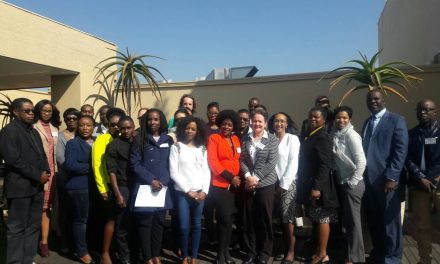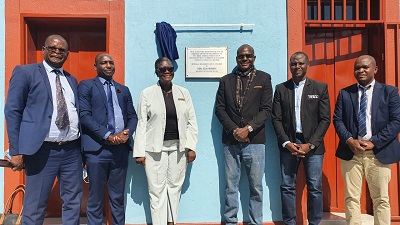
Monitoring qualification standards

Mr Franz Gertze is the CEO of the Namibia Qualifications Authority which was established by an Act of Parliament in 1996 with the mandate to exercise and perform the statutory powers, duties and functions in line with the Act. This includes but is not limited to set up and administer a National Qualifications Framework, set up the occupational standards for any occupation, job, post or position in any career structure; accredit persons, institutions and organizations providing education and courses of instruction or training and advise any person, body, institution, organization or interest group on matters pertaining to qualifications and national standards for qualifications
For Namibia to attain its objective to become an industrialised nation by 2030, it is imperative for the country to produce an appropriately skilled and educated workforce.
Education, and by extension, qualifications is the first step towards sustainable socio-economic development and attaining national objectives.
As such, quality assurance is critical in education and training, as it not only facilitates enhancement of employability of graduates but also ensures that the link between educational outcomes and societal needs is strengthened.
It is therefore the NQA’s quest to ensure that all institutions of higher learning in Namibia offer programmes and qualifications that meet the required standards and are aligned to the national developmental goals as outlined in both vision 2030 and NDP 4.
This will require vigorous engagement with and co-operation from relevant stakeholders in the education sector, specifically training providers who are entrusted with the responsibility of imparting skills and knowledge on to future generations.
The NQA thus invites all training providers to proactively apply for accreditation and register all their programmes on the National Qualifications Framework (NQF).
This creates a win-win situation for all parties- the institution achieves status of good standing and operates legally which will inspire public trust and confidence in its programmes and peace of mind for students.
The NQA as the industry regulator is there to protect the public from unscrupulous individuals who are running bogus institutions and misleading the nation.
It is for this reason that the NQA implores prospective students to think carefully before enrolling at any institution of higher learning.
While a qualification can represent hope for economic emancipation and a better future, that dream can tum into a nightmare if that qualification is attained from an unaccredited institution.
People should not be misled by certain institutions that spend thousands of dollars advertising on radio and full page adverts in the newspapers – all the while offering unregistered qualifications that are not worth the paper they are printed on.
The only way to be absolutely sure of the legal status of any institution in Namibia or abroad is through verification and confirmation by the NQA.
On a quarterly basis, after each Council meeting, the NQA releases a list containing all the accredited institutions of higher learning in Namibia. The importance of this is to empower the public with information which enables them to make informed decisions when enrolling at institutions of higher teaming. It is thus crucial for the public to be aware that if an institution is not on that list, it is not regarded as of good standing and its qualifications will thus not be evaluated by the NQA. The latest list is available from the NQA website, www.namga.org.
NQA evaluation and recognition of qualifications is important for various reasons and such is a crucial key to employment and academic achievement. For instance, most prospective employers often stipulate academic requirements at specific levels on the National Qualifications Framework (NQF} which can only be determined through the evaluation of qualifications by the NQA.
Additionally, it is a pre-requisite for most universities/colleges when applying for further studies both in Namibia and abroad. One of the NQA’s strategic goals this year is to take the institution and its services to the people.
With increasing demand for higher education, coupled with the growing threat of qualifications fraud, it has become increasingly important for the NQA to become more visible, known and accessible to the public.
In order to achieve this, the Authority will be rolling out aggressive public education interventions to be carried out throughout the country and in both the mainstream and social media.
The ultimate goal is to increase public awareness and knowledge the NQA and most importantly of the role the Authority plays in ensuring that all qualifications offered in Namibia are quality assured and meet the set national standards.












































